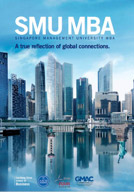
For anyone looking to advance in their careers, an MBA is widely viewed as a plus point. However, what many fail to realise is that the postgraduate degree can be particularly beneficial for high-fliers across multiple industries, not just business leaders. After all, while the economic landscape is ever-changing, the value of an MBA remains constant — especially in a world disrupted by globalisation, digital transformation, an ongoing pandemic and increasing conflict.
For example, US diplomat and recent SMU MBA graduate Hoce Kalkas feels that the programme equips graduates with a “powerful toolkit” that helps maximise their talents in challenging situations.
Coming from a multifaceted background herself – Hoce not only has a degree in Nutrition and Food Science, a stint at Le Cordon Bleu cooking school in Paris, and a Master of Public Health degree to boot – she brought with her to the MBA table a background in public service and non-profit organisations.
“While most roles in public service are very specialised, in the world of business, being savvy across multiple heavy-hitting channels such as accounting, marketing, finance, entrepreneurship and strategic management is critical in having a holistic approach in executing any strategy,” she says.
A former university professor in the US, Hoce values how the SMU MBA is designed with small class sizes for greater interaction, and boasts a class profile of 65 per cent international students. It therefore offers a high level of global exposure through coursework, interactions with classmates from all over the world, and internship and job opportunities.
Moreover, she notes that her classmates were “as diverse as they come; we had representation from over 14 different countries”.
“My fellow classmates were incredibly accomplished with an array of amazing backgrounds,” adds Hoce, who is a diplomat at the United States Embassy in Singapore.
“The way the SMU MBA programme is structured, teamwork is a critical component, which means you need to rely on your colleagues to not only bring their game to the table, but also support your success by contributing their professional knowledge and skills.
This made for rich class discussions and lively collaboration.”
MBA as a pivot point for the future
But why embark upon an MBA programme in Singapore, especially having been an educator in the US?
“I am looking to apply this diverse perspective to large-scale operations within a fast-paced corporate landscape,” Hoce explains, a major change from her teaching and previous public-service experience.
In fact, Hoce promptly began to research her options for continuing her studies when she learned of her assignment to the US Embassy in Singapore.
“Choosing the right MBA programme involved intense research, various applications, and numerous discussions with admissions and university representatives along the way,” she says.
“Some programmes looked good on paper, but at the end of the day, I felt a connection with SMU — both with its people as well as what the programme offered, and the kind of experience I wanted.”
In today’s competitive milieu, a sought-after internship during an MBA also allows students to apply the skills picked up in the classroom to a real-world business setting, and gain experience in their desired field. Work placements provide the opportunity to gain real-world experience and networking contacts, which can be key to career progression upon graduation.
“I was very drawn to the opportunity to undergo an internship with one of many multi-national companies located in Singapore as part of the MBA curriculum,” explains Hoce, who completed a four-month-long internship with Nestlé.
At SMU, a dedicated Postgraduate Career Services Centre facilitates networking opportunities and serves as a principal point of contact for employers. It also preps students for the job market and ensures that all MBA students secure internships during the programme.
Further, Hoce appreciated the case-study method adopted in the programme “designed to impart as much real-world experience as possible within a compressed timeframe”.
The case studies, drawn from SMU’s Centre for Management Practice (CMP) Case Writing Initiative, largely focused on stories drawn from Asian companies, as a counterpoint to more commonly-taught Western examples.
“My professors’ careful curation of cases were relevant across many applications and proved to be extremely insightful.”
Time management to succeed
Earning an MBA can be a great way to enhance one’s skillsets and knowledge. However, balancing work with a rigorous academic programme can be challenging. As with all full-time MBA students, Hoce had quite a juggling act to perform.
“The nature of the work can be challenging, but over the past year, my schedule was very flexible and forgiving. I am very fortunate, as this allowed me to focus on my MBA and put my best foot forward – with the help of time management skills, of course,” reveals Hoce.
“I was literally running from one place to the next. As such, I made a habit of breaking bigger projects into more manageable smaller tasks, and conducting a daily prioritisation check to ensure I devote my time to tasks that were the most valuable.”
And just like how Facebook chief operating officer and author of Lean In, Sheryl Sandberg, admitted how critical a loving partner can be for women both professionally and personally, Hoce also credits her supportive husband in the pursuit of her academic goals: “From day one, he acknowledged the importance of my MBA studies and did everything in his power to provide me with time and space to focus on the things I needed to get done.”
Cultures to expand the mind
While traditional MBA programmes may have been synonymous with competition and individual achievement, in reality, teamwork and collaboration are essential aspects of any robust business school programme — and a key ingredient for professional success.
“My best memories during the MBA programme revolved around the people who contributed to my learning,” relates Hoce.
“We learned a lot about working as a team among an array of cultures, often exploring different viewpoints, and we all found commonalities that bonded us together – which led to a collaborative and fun environment.”
Moreover, she enjoyed how her Singaporean classmates provided insights into “the values that are important, the culture that drives the people, and the small nuances that usually take years to key into as an outsider to a community.”
“The personal connections were meaningful and superior to anything you can extract from literature or media,” Hoce adds.
Speak to our Admissions Advisors
Singapore Management University
Lee Kong Chian School of Business
Graduate Programmes Office, Level 4
50 Stamford Road, Singapore 178899
Tel: +65 6828 0882
Join us at the upcoming events
You may also be interested in
Executive Master of Business Administration (EMBA)
